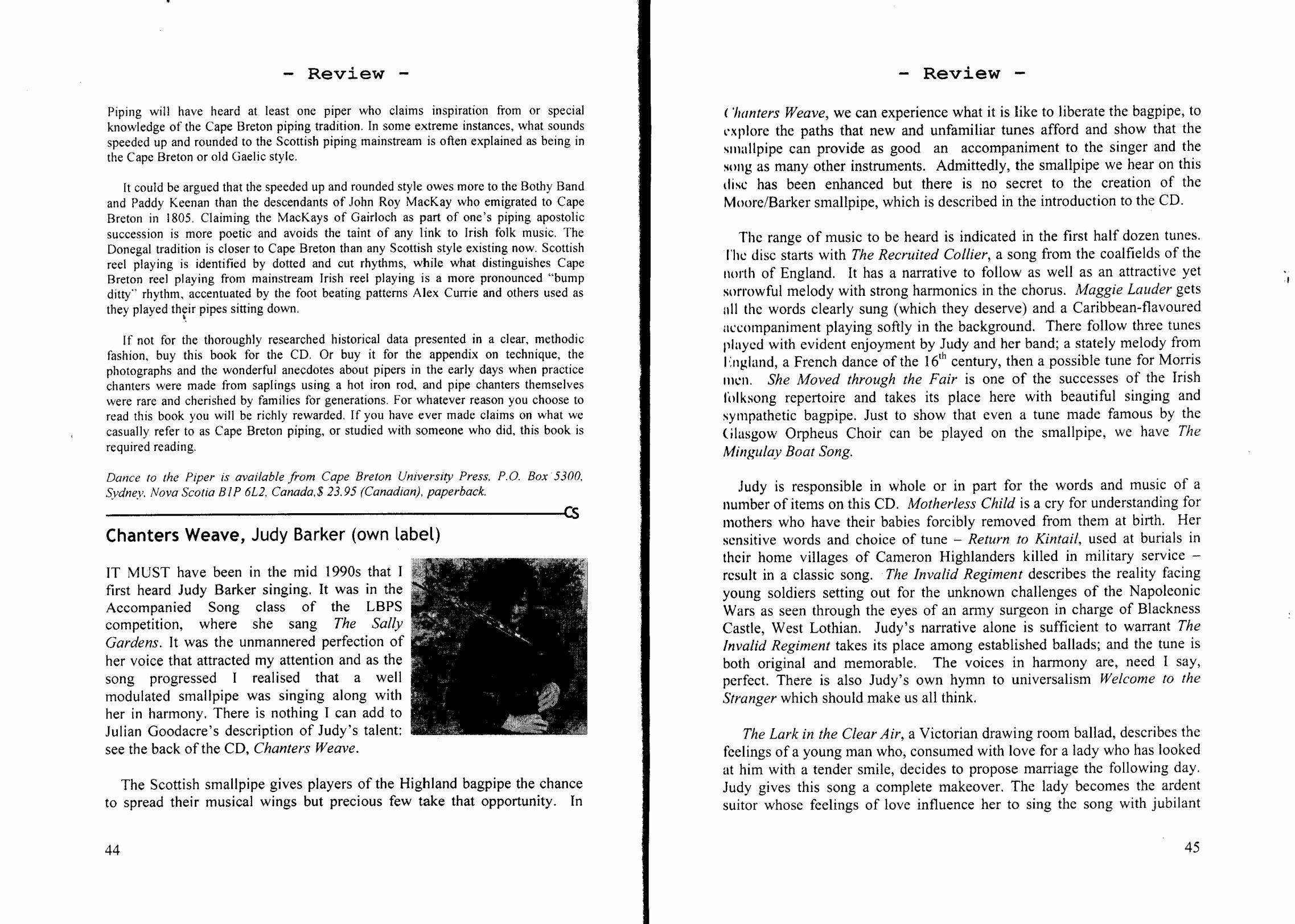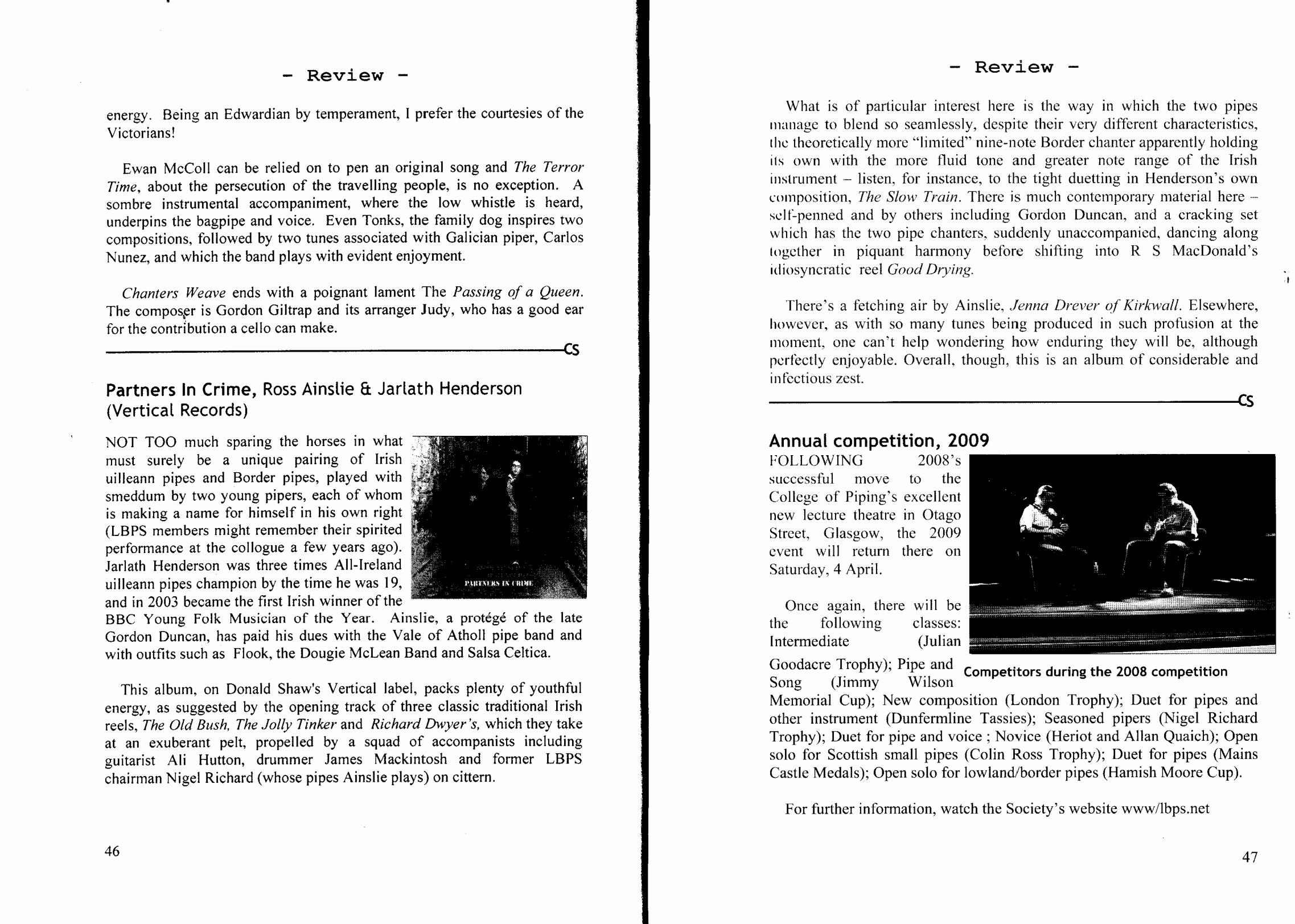Review: CD - Chanters Weave


Chanters Weave, Judy Barker
(own label)
IT MUST have been in the mid 1990s that I first heard Judy Barker singing. It was in the Accompanied Song class of the LBPS competition, where she sang The Sally Gardens. It was the unmannered perfection of her voice that attracted my attention and as the song progressed I realised that a well modulated smallpipe was singing along with her in harmony. There is nothing I can add to Julian Goodacre's description of Judy's talent: see the back of the CD, Chanters Weave.
The Scottish smallpipe gives players of the Highland bagpipe the chance to spread their musical wings but precious few take that opportunity. In Chanters Weave, we can experience what it is like to liberate the bagpipe, to explore the paths that new and unfamiliar tunes afford and show that the smallpipe can provide as good an accompaniment to the singer and the song as many other instruments. Admittedly, the smallpipe we hear on this disc has been enhanced but there is no secret to the creation of the Moore/Barker smallpipe, which is described in the introduction to the CD.
The range of music to be heard is indicated in the first half dozen tunes. The disc starts with The Recruited Collier, a song from the coalfields of the north of England. It has a narrative to follow as well as an attractive yet sorrowful melody with strong harmonics in the chorus. Maggie Lauder gets all the words clearly sung (which they deserve) and a Caribbean-flavoured accompaniment playing softly in the background. There follow three tunes played with evident enjoyment by Judy and her band; a stately melody from England, a French dance of the 16th century, then a possible tune for Morris men. She Moved through the Fair is one of the successes of the Irish folksong repertoire and takes its place
here with beautiful singing and sympathetic bagpipe. Just to show that even a tune made famous by the Glasgow Orpheus Choir can be played on the smallpipe, we have The Mingulay Boat Song.
Judy is responsible in whole or in part for the words and music of a number of items on this CD. Motherless Child is a cry for understanding for mothers who have their babies forcibly removed from them at birth. Her sensitive words and choice of tune - Return to Kintail, used at burials in their home villages of Cameron Highlanders killed in military service - result in a classic song. The Invalid Regiment describes the reality facing young soldiers setting out for the unknown challenges of the Napoleonic Wars as seen through the eyes of an army surgeon in charge of Blackness Castle, West Lothian. Judy's narrative alone is sufficient to warrant The Invalid Regiment takes its place among established ballads; and the tune is both original and memorable. The voices in harmony are, need I say, perfect. There is also Judy's own hymn to universalism Welcome to the Stranger which should make us all think.
The Lark in the Clear Air, a Victorian drawing room ballad, describes the feelings of a young man who, consumed with love for a lady who has looked at him with a tender smile, decides to propose marriage the following day. Judy gives this song a complete makeover. The lady becomes the ardent suitor whose feelings of love influence her to sing the song with jubilant energy. Being an Edwardian by temperament, I prefer the courtesies of the Victorians!
Ewan McColl can be relied on to pen an original song and The Terror Time, about the persecution of the travelling people, is no exception. A sombre instrumental accompaniment, where the low whistle is heard, underpins the bagpipe and voice. Even Tonks, the family dog inspires two compositions, followed by two tunes associated with Galician piper, Carlos Nunez, and which the band plays with evident enjoyment.
Chanters Weave ends with a poignant lament The Passing oƒ a Queen. The composer is Gordon Giltrap and its arranger Judy, who has a good ear for the contribution a cello can make.
